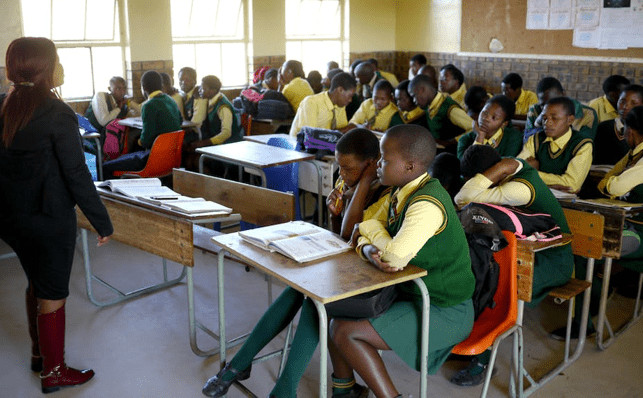Ban smartphones in schools and Put learners first
A UN research has proposed that countries, governments and authorities should ban smartphones in schools to reduce classroom disturbance, promote learning, and protect children from cyberbullying.
According to Unesco, the United Nations’ education, science, and cultural agency, there is evidence that excessive mobile phone use is associated with lower educational achievement and that excessive screen time has a negative impact on children’s emotional stability.
It claimed that its proposal for a smartphone ban sends a clear message that digital technology in general, including artificial intelligence, should always be subservient to a “human-centered vision” of education and should never be used to replace face-to-face engagement with teachers.
Unesco cautioned policymakers against a hasty adoption of digital technology, claiming that its positive influence on learning outcomes and economic efficiency may be overestimated, and that new was not necessarily better. “Not all change equals progress.” “Just because something is possible does not mean it should be done,” the report said.
It recommended policymakers not to overlook the “social dimension” of education, where students receive face-to-face instruction, as more learning moves online, particularly in institutions. “Those who advocate for increased individualization may be missing the point of what education is all about,” it stated.
“The digital revolution has enormous potential, but just as warnings have been issued about how it should be regulated in society, similar attention must be paid to how it is used in education,” said Audrey Azoulay, director general of Unesco.
“Its use must be for enhanced learning experiences and the wellbeing of students and teachers, not to their detriment,” she stressed. Keep the learner’s needs first and teachers in mind. Online interactions are not a replacement for human interaction.”
According to Unesco, countries must ensure that they have clear objectives and principles in place to ensure that digital technology in education is beneficial and avoids harm, both to individual students’ health and, more broadly, to democracy and human rights, such as invasion of privacy and incitement of online hatred.
Excessive or inappropriate student use of technology in the classroom and at home, whether cellphones, tablets, or laptop computers, could be distracting, disruptive, and have a negative influence on learning, according to the report. It referenced large-scale worldwide assessment data indicating a “negative link” between excessive digital technology use and student performance.
Although technology has the potential to open up learning possibilities for millions, the benefits have been unequally distributed, with many impoverished people from around the world essentially disenfranchised, according to the report. A computerized educational infrastructure was costly, and the environmental consequences were frequently underestimated.
According to Unesco’s 2023 Global Education Monitor study, there was little robust research to establish that digital technology intrinsically provided value to education. Private education corporations attempting to sell digital learning solutions financed much of the evidence. It went on to say that their expanding influence on education policy around the world was “cause for concern.”
According to Unesco, countries were “waking up to the importance of putting learners first” when it comes to digital technology. It highlighted China as having set limits for the use of digital devices as teaching tools, limiting them to 30% of total teaching time and requiring pupils to take regular screen breaks.
It acknowledged that online learning “stopped education melting down” when schools and universities closed during Covid-19 lockdowns. It predicted that more than a billion students worldwide switched to online schooling during the pandemic, but it also stated that millions of impoverished students who did not have internet access were excluded.
According to Unesco’s analysis of 200 education systems around the world, one in every six countries has outlawed cellphones in school, either by law or recommendation. These countries included France, which implemented its policy in 2018, and the Netherlands, which will impose limits beginning in 2024.
The Dutch education minister, Robbert Dijkgraaf, announced the restriction this month, saying, “Students need to be able to concentrate and be given the opportunity to study well.” According to scientific evidence, mobile phones are a nuisance. We must safeguard students from this.”
In the United Kingdom, former education secretary Gavin Williamson advocated for a mobile phone ban in schools in 2021 as part of a crackdown on poor student discipline, but education unions criticised this as a “distraction” because schools have smartphone use restrictions in place for years.
Smartphone policy in UK secondary schools differ since they are determined by individual headteachers. They usually make sure phones are turned off and out of sight when on school grounds, and that they can only be used in the classroom with the teacher’s approval. Misuse of cell phones or other digital devices on school grounds may result in confiscation and consequences such as incarceration.
“The majority of schools will already have robust policies about mobile phones in place,” said Geoff Barton, general secretary of the Association of School and College Leaders. In most cases, students will be either barred from using them totally during the school day or restricted to using them only in specified circumstances.
“A complete ban on mobile phones on school grounds would raise some practical concerns, such as parents wanting to contact their children while traveling between school and home.” Some students will also use their phones to pay for public transportation.”
“We completely understand the legitimate concerns about mobile phone use, such as cyberbullying, the impact of extended screen time on mental health, and the lack of regulation of large technology companies,” he added. However, the widespread use of smartphones is a societal issue, and the problems that arise as a result are more likely to occur outside of the school gates.”




